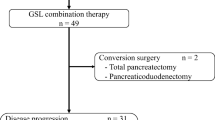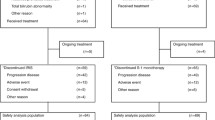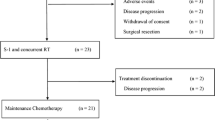Abstract
Purpose
To evaluate the efficacy and safety of the combination of gemcitabine (GEM) and S-1 (GS) in comparison to GEM alone (G) for unresectable pancreatic cancer.
Methods
In this multicenter randomized phase II study, we randomly assigned unresectable pancreatic cancer patients to either the GS group or the G group. The GS group regimen consists of intravenous 1,000 mg/m2 GEM during 30 min on days 1 and 8, combined with 80 mg/m2 oral S-1 twice daily on days 1–14, repeated every 3 weeks. On the other hand, the G group regimen consists of intravenous 1,000 mg/m2 GEM on days 1, 8, and 15, repeated every 4 weeks. The primary endpoint was objective response rate (ORR). Secondary end points included treatment toxicity, clinical response benefit, progression-free survival (PFS), and overall survival.
Results
We registered 117 patients from 16 institutions between June 2007 and August, 2010. The ORR of the GS group was 28.3%, whereas that of the G group was 6.8%. This difference was statistically significant (P = 0.005). The disease control rate was 64.2% in the GS group and 44.1% in the G group. Median PFS was 6.15 months in the GS group and 3.78 month in the G group. This was also statistically significant (P = 0.0007). Moreover, the median overall survival (OS) of the GS group was significantly longer than that of the G group (13.7 months vs. 8.0 months; P = 0.035). The major grade 3–4 adverse events were neutropenia (54.7% in the GS group and 22.0% in the G group), thrombocytopenia (15.1% in the GS group and 5.1% in the G group), and skin rash (9.4% in the GS group).
Conclusions
The GS group showed stronger anticancer activity than the G group, suggesting the need for a large randomized phase III study to confirm GS advantages in a specific subset.





Similar content being viewed by others
References
Ministry of Health, Labour and Welfare (2010) The dynamic statistics of the population in 2010. Available from http://www.mhlw.go.jp/toukei/saikin/hw/jinkou/geppo/nengai08/toukei6.html. Accessed 26 July 2011
Burris HA 3rd, Moore MJ, Andersen J, Green MR, Rothenberg ML, Modiano MR et al (1997) Improvements in survival and clinical benefit with gemcitabine as first-line therapy for patients with advanced pancreas cancer: a randomized trial. J Clin Oncol 15:2403–2413
Moore MJ et al (2007) Erlotinib plus gemcitabine compared with gemcitabine alone in patients with advanced pancreatic cancer: a phase III trial of the National Cancer Institute of Canada Clinical Trials Group. J Clin Oncol 25:1960–1966
Cunningham D et al (2009) Phase III randomized comparison of gemcitabine versus gemcitabine plus capecitabine in patients with advanced pancreatic cancer. J Clin Oncol 27:5513–5518
Saif MW et al (2009) S-1: a promising new oral fluoropyrimidine derivative. Expert Opin Investig Drugs 18:335–348
Shirasaka T (2009) Development history and concept of an oral anticancer agent S-1 (TS-1): its clinical usefulness and future vistas. Jpn J Clin Oncol 39:2–15
Ueno H et al (2005) An early phase II study of S-1 in patients with metastatic pancreatic cancer. Oncology 68:171–178
Okusaka T et al (2008) A late phase II study of S-1 for metastatic pancreatic cancer. Cancer Chemother Pharmacol 61:615–621
Nakamura K et al (2006) Phase II trial of oral S-1 combined with gemcitabine in metastatic pancreatic cancer. Br J Cancer 94:1575–1579
Lee GW et al (2009) Phase II trial of S-1 in combination with gemcitabine for chemo-naive patients with locally advanced or metastatic pancreatic cancer. Cancer Chemother Pharmacol 64:707–713
Kim MK et al (2009) S-1 and gemcitabine as an outpatient-based regimen in patients with advanced or metastatic pancreatic cancer. Jpn J Clin Oncol 39:49–53
Oh DY et al (2010) A multicenter phase II study of gemcitabine and S-1 combination chemotherapy in patients with unresectable pancreatic cancer. Cancer Chemother Pharmacol 65:527–536
Ueno H et al (2011) Multicenter phase II study of gemcitabine and S-1 combination therapy (GS Therapy) in patients with metastatic pancreatic cancer. Jpn J Clin Oncol
Ioka T et al (2011) Randomized phase III study of gemcitabine plus S-1 versus S-1 versus gemcitabine in unresectable advanced pancreatic cancer in Japan and Taiwan: GEST study. J Clin Oncol 29(suppl; abstr 4007)
Berlin JD et al (2002) Phase III study of gemcitabine in combination with fluorouracil versus gemcitabine alone in patients with advanced pancreatic carcinoma: Eastern Cooperative Oncology Group Trial E2297. J Clin Oncol 20:3270–3275
Cunningham D et al (2009) Phase III randomized comparison of gemcitabine versus gemcitabine plus capecitabine in patients with advanced pancreatic cancer. J Clin Oncol 27:5513–5518
Isayama H et al (2011) The final analysis of a multicenter randomized controlled trial of gemcitabine (G) alone versus gemcitabine and S-1 combination therapy (GS) in patients with unresectable advanced pancreatic cancer (PC): GEMSAP study. J Clin Oncol 29(suppl; abstr 4040)
Acknowledgments
We are grateful to K. Aiba, Y. Shimada, and R. Kuwatsuru for their kind advice. We also thank T. Sudo and S. Koyama for their data management and Prof M. Takeuchi of Kitasato University for his rigorous statistical analysis. The authors are also indebted to Prof. J. Patrick Barron, Chairman of the Department of International Medical Communications of Tokyo Medical University, who is a remunerated consultant of Taiho Pharmacology for his review of this manuscript. This study was presented in part at the 2011 ASCO Annual Meeting, Chicago, Illinois and the 9th Annual Meeting of the Japanese Society of Medical Oncology, Yokohama, Japan, 2011. This study was supported by JACCRO.
Conflict of interest
No authors have any conflict of interest.
Author information
Authors and Affiliations
Corresponding author
Appendix
Appendix
The following investigators registered patients for this study:
Hiroshi Ishii (Cancer Institute Hospital, Tokyo, Japan); Yuji Matsumura (Juntendo University School of Medicine, 2-1-1 Tokyo, Japan); Naoto Egawa, Yasushi Omuro (Tokyo Metropolitan Cancer and Infectious Diseases Center Komagome Hospital, Tokyo, Japan); Atsushi Sofuni, Fumihide Itokawa (Tokyo Medical University Hospital, 6-7-1, Nishi-Shinjuku, Tokyo, Japan); Hisatsugu Mouri (Kanazawa University,13-1, Ishikawa, Japan); Keiji Hanada, Tomohiro Iiboshi (JA Onomichi General Hospital, Hiroshima, Japan); Yasutoshi Kimura (Sapporo Medical University School of Medicine, Hokkaido, Japan); Takeo Ukita, Takuro Endo, Hiroaki Shigoka (Toho University Ohashi Medical Center, Tokyo, Japan); Yusuke Ishida (Kurume University School of Medicine,Fukuoka, Japan); Manabu Kawai (Wakayama Medical University, Wakayama, Japan); Takaaki Ikeda (Yokosuka Kyosai Hospital, Kanagawa, Japan); Tsutomu Hijioka (Kumamoto Red Cross Hospital, Kumamoto, Japan); Ryohei Watanabe (Matsuyama Shimin Hospital, Ehime, Japan); Shinya Ohoka (Tokyo Medical and Dental University, Tokyo, Japan).
Yuki Hirose (Japan Red Cross Fukui Hospital, Fukui, Japan); Takaaki Ikari (Tobu Chiiki Hospital Tokyo Metropolitan Health and Medical Treatment Corporation, Tokyo, Japan).
Rights and permissions
About this article
Cite this article
Ozaka, M., Matsumura, Y., Ishii, H. et al. Randomized phase II study of gemcitabine and S-1 combination versus gemcitabine alone in the treatment of unresectable advanced pancreatic cancer (Japan Clinical Cancer Research Organization PC-01 study). Cancer Chemother Pharmacol 69, 1197–1204 (2012). https://doi.org/10.1007/s00280-012-1822-1
Received:
Accepted:
Published:
Issue Date:
DOI: https://doi.org/10.1007/s00280-012-1822-1




